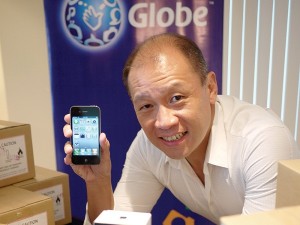DURING weekends, Ernest Cu spends time with his family, plays golf and drives exotic cars.
Come Monday when Cu steps into his office, Cu is in a warzone—and he likes it.
Unlike most men who crave solitude, Cu, who has been at the helm of Ayala-owned Globe Telecom as CEO since 2009, believes that peace means no one wants to take you out. And in a competitive industry like the Philippines’ telecom sector, peace means you aren’t doing your job right.
“It was very peaceful when we were losing market share. But when you take market share, they attack you,” Cu says. “It’s a very competitive industry. And for me, as a person, I enjoy it. I’m very competitive. I like things that change very fast.”
His penchant for constantly shifting sands, which Cu says was typical of any “geek” like himself, shows in his resumé.
Living in the US in the 90s, Cu helped establish SPi Technologies, one of the pioneers that helped bring call center jobs to the Philippines during the beginnings of the now booming business process outsourcing (BPO) sector.
SPi, renamed as SPi Global, is now the largest Philippine-owned BPO company in the world. Ironically, SPi was acquired by the group of Philippine Long Distance Telephone Co. (PLDT), Globe’s chief rival.
Three years ago, Cu, a man who rarely hesitates to speak his mind, was recruited by the usually conservative Ayala group to head Globe, one of the conglomerate’s biggest cash cows.
“My philosophy is if they wanted the company to run the way it has been run, then why get someone like me?” he points out in a recent interview with SundayBiz.
He admits that the job, the most high-profile post he’s ever taken, has led to less time to spend with his family. “But they understand. So we strive for quality instead of quantity.”
Early in the decade, the goal was to get more first-time mobile phone users. Today, however, the battle has shifted, and winning means taking away as many subscribers from your rival as possible.
And what a rival Globe faces. Globe, co-owned by Singapore’s SingTel, corners roughly a third of the telecom industry in revenues and subscribers. The rest of the industry is dominated by PLDT, which, through mobile units Smart Communications, Sun Cellular, and Talk N’ Text, enjoys a 67-percent market share.
“They won’t allow us to take a better position,” Cu says, citing recent negative campaigns mounted by the PLDT group to tarnish Globe’s reputation with subscribers. Cu says he strives to be more of a gentleman, but what he calls “black ops,” some could call fair game.
“They are very aggressive in everything. They are committed and when they like something, they go all the way,” Cu adds, describing PLDT’s management team led by Manuel V. Pangilinan.
“They don’t play with the gloves on,” Cu points out, admitting to being somewhat affected by PLDT’s “Live More” campaign that looks to highlight Globe’s perceived shortcomings in providing reliable services.
He says Globe’s reputation has suffered over the past months because the PLDT campaign and the opinions of “a few very noisy people” concerning the reliability of the company’s services.
“If the majority of our subscribers really had issues with us, then we would be losing market share. But we have been gaining market share,” he says.
“When Globe built its market share, we didn’t have to smear anyone to do it. We just improved our product, distribution, and customer service. We got that formula right,” he says.
He adds that Globe’s subscribers need not wait much longer to feel significant improvements in the telco’s service, with the company’s modernization expected to be completed by the first semester of 2013.
Apart from trying to change Globe’s position in the market, Cu says his mission was to change Globe itself. He states that what’s more important than creating better products was bringing the ability to innovate back into Globe.
When he does step down as CEO, as all leaders do, he says he wants to leave the company in a healthier state. “I don’t want to leave Globe as a margin factory where people are unhappy,” he says.
“I want Globe to be a little bit more evolved and have a more entrepreneurial feel,” he says. “I also want to have a line of successors so we don’t have to hire my replacement from outside,” he adds.
